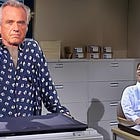America's Least Funny People Ecstatically Cry 'Comedy Is Back!' As Shane Gillis Drops Slurs On SNL
God, this is so sad.
This weekend, comedian Shane Gillis — whom I admit I was only nominally aware of to begin with — hosted “Saturday Night Live.” Gillis was previously cast on SNL in 2019 but fired before he ever made an appearance, after racist and homophobic clips came to light. Apparently they have different standards for actually hosting the show.
Did I actually watch the show? I did not. I can’t actually remember the last time I actually watched “Saturday Night Live” live. What I did catch, however, were the tweets from weird people overjoyed by the fact that Gillis “used gay and ret*rd” in his opening monologue, declaring that “comedy is back.”
I was not terribly surprised by the reaction or the “relief.” I actually think there are a lot of people who just never “learned” how to be funny beyond that and who would see the return of those words becoming acceptable to use as slurs again as something that would bring back the social power they once enjoyed. You know, in middle school. When it was still cool to make fun of people for being weird or different.
After all, nothing says “No one has laughed at anything I’ve said since middle school” quite like thinking these words are the height of comedy.
I would argue that the first shot fired in today’s current culture war was in 2012, when comedian Daniel Tosh told a rape joke during an appearance at the Laugh Factory. A woman in the audience at the show responded “Rape jokes are never funny!” and Tosh responded with “Wouldn’t it be funny if that girl got raped by, like, five guys right now? Like right now?”
The shot wasn’t fired by Tosh. It was fired by feminists who did not, in fact, think that would be funny and publicly said as much. The real anger, the real fury, however, came from those who were horrified by the idea of a world without rape jokes.
It was really the first time in a long while that a feminist discourse had gone that public. It pushed a button that unleashed a certain flavor of male rage that, I believe, ultimately found form in Gamergate, the rise of incels, Red Pill theory and other flavors of online misogyny — and, ultimately, Trumpism.
And it came from finding out that everyone didn’t think a certain kind of joke was funny.
I also fully believe that a lot of anger over trans people existing and being treated like people was due to the loss of their very precious “That’s a man, baby!” jokes. It’s certainly a large part (if not all) of the rage people get over fat acceptance or, godforbid, being told that a person being an asshole does not give anyone a special free pass to make fun of their weight without also being an asshole themselves.
Because you can tell, you know? When “good people” have been biting their tongue on the fat jokes for a certain amount of time and are just so relieved to have a bad fat person to unleash them all on.
I’m trying to figure out a way to say this that does not suggest that anyone should have empathy or pity for the poor douchebags who don’t know how to be “funny” without using gay as a slur or saying ret*rd or by punching down in general. Obviously I do not think this. But I do think that people have a lot more abject terror over social interactions and social rejection than we realize. And there is a possibility that being told, “These things you used as a crutch, these things you said to fit in, to get laughs, to ensure that people were laughing at someone or some group of people other than you, not only can you not have them anymore, but if you do use them, you will experience the rejection you were using them to ward off in the first place” — that actually does send a lot of them right off the deep end.
This does not mean that we should stop pushing for the kind of social change that makes that kind of punching down obsolete — just as the fact that men frequently go on killing sprees because their romantic advances were rejected doesn’t mean that women should have to date with men they are not interested in. But I do think we probably need to do more to help people with social interactions and processing social rejection in a healthy way than we do currently.
Of course, it’s not just about being funny and getting laughs. It’s also about a perceived loss of social power. The kids who made these jokes in middle school weren’t actually funny, people were just scared of them. They were bullies. People laughed and went along so they wouldn’t be next, and that’s a kind of power that certain kinds of people find intoxicating. A lot of men, especially, love the idea of being the guy about whom people say “Oh, he’s an asshole at first, but once you get to know him he’s a great guy,” because it’s a pretty big compliment if people will put up with abuse in hopes of getting to the Tootsie Roll center.
If you’re an asshole and people put up with your shit and laugh at your bad jokes, you win. If they don’t … well, then you’re just an asshole, aren’t you?
All of this being said, if these people think that this one guy saying these words in one monologue on “Saturday Night Live” is the permission slip to start using them themselves (without risking people thinking they are assholes or punching them in the face) that they’ve been waiting for, it’s definitely not.
PREVIOUSLY:









I was an honor graduate of USMC, won the Commandant's award, blah blah blah.
In the final class on small unit leadership, the lecturer (one Captain Martinez) told a homophobic :joke" that remains one of the most repulsive things I have ever heard. Even with that audience--1980s Marine officer candidates--the laughter was awkward and motivated solely by fear, since failing that class and test (SULE II) was instant bounce from the school.
I declined my commission and cited this incident as the reason to the recruiter because fuck that. If the Marines were tolerating that shit in a class at OCS I wanted nothing to do with them. Here endeth the sermon.
Jeez, now I can’t tell rape jokes?! I was already feeling economically anxious but this’ll put me over the edge.
Hang on, here comes a New York Times reporter.